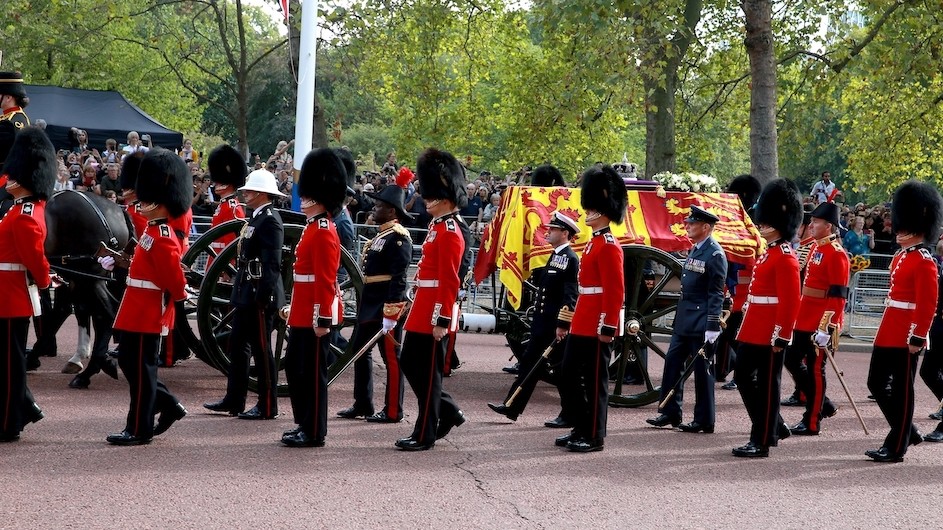A Look Back at Queen Victoria and Her Monarchy to Reflect on Queen Elizabeth II's Reign
Queen Elizabeth's funeral marked the end of the longest reigning monarch in British history. What does the future hold for the British monarchy?

It wasn’t the death of Queen Elizabeth, who was 96 after all, so much as the overwhelming media and public response that sent me back last week to Walter Bagehot’s The English Constitution, probably the greatest work written on the role of the monarchy in British life. Writing in the mid-1860s, half-way into another English Queen’s long reign, Bagehot flatly stated that people were wrong to deplore all the attention paid to the trivial comings and goings of “a retiring widow and an unemployed youth” – that is, to Victoria and her son and heir Edward (or Bertie). The work of government is complex and mostly boring, he wrote, but “a family on a throne” is always interesting, especially if that family’s job is to “sweeten politics by the seasonable addition of nice and pretty events.” Victoria’s contribution to political stability was, he wrote, “incalculable,” not because she shaped government policy, but rather because she had adroitly colonized the public mind and heart.
Two queens have been on the British throne for fully two-thirds of the last 200 years (Victoria for 64 years, Elizabeth for 70), their performance raising the question of whether women might do this job rather better than men. Of course, the insatiable public appetite for domestic details about the royal family—and that family’s willingness to feed it—carries its own risks: Victoria came in for public criticism when she went into seclusion after her beloved Albert’s death, Elizabeth when her children’s marriages went off the rails and the spouses started talking. But neither queen (unlike their male relations) went mad, took lovers, or abdicated. Victoria was more willful, making clear her dislike of her Liberal prime minister, her pleasure in her imperial role, and her loathing of the “mad, wicked, folly of women’s rights.” Her great-great granddaughter was far more circumspect.
Because I’m a British historian, people have asked me quite a lot in the last 10 days what the Queen was “like.” The very question betrays how little we understand her role. We know that she liked horses and dogs and an outdoor life; we know that on a few occasions—the Suez crisis, the U.S. invasion of Grenada—she exercised her prerogative to counsel and warn. But the main thing we know is that she had, really from girlhood, a serious commitment to her constitutional duty as she saw it. Seven decades of christening battleships, bestowing honors, hosting foreign dignitaries, opening hospitals, touring Commonwealth countries and the remaining bits and pieces of the British Empire, and opening Parliament (where she had to outline the legislative plans of “her government” whether she deplored them or not) followed. If she found that remorseless schedule tiring or annoying, she never let it show. She knew she was supposed to be above politics, and in performing that role she has had—even in death—a political effect. British trade unions have called off planned strikes; Australia’s republican movement issued condolences; Americans (rather forgetting they fought a war so as not to be subjects of the British crown) have been flying their flags at half-mast.
This moment will pass, though. Victoria’s death coincided with—and perhaps fostered—a shift in mood; this is why the words “Victorian” and “Edwardian” have such different connotations. Might the passing of Elizabeth signal change as well? Constitutional monarchy is, in Britain, hardly under threat: Charles is in his 70s, his indiscretions and marital woes long past; William and Kate seem committed to their prescribed role. But whether all the countries that have retained the British monarch as head of state will continue to do so is very much an open question. I am a Canadian citizen, and even I find it strange that independent Canada has a foreign monarch as head of state—and if I were (say) Jamaican, my ancestors brought over in slave ships to toil on plantations, their “owners” compensated by the British government for the abolition of slavery in 1833, I might find that relationship stranger still. Even the most flawless performance of a monarchical role won’t hold some conversations and claims in abeyance forever.

Susan Pedersen, the Gouverneur Morris Professor of History, specializes in British history, the British empire, comparative European history, and international history. Her book about the League of Nations and its impact on the imperial order, The Guardians: The League of Nations and the Crisis of Empire, was published by Oxford University Press in summer 2015.
This column is editorially independent of Columbia News.